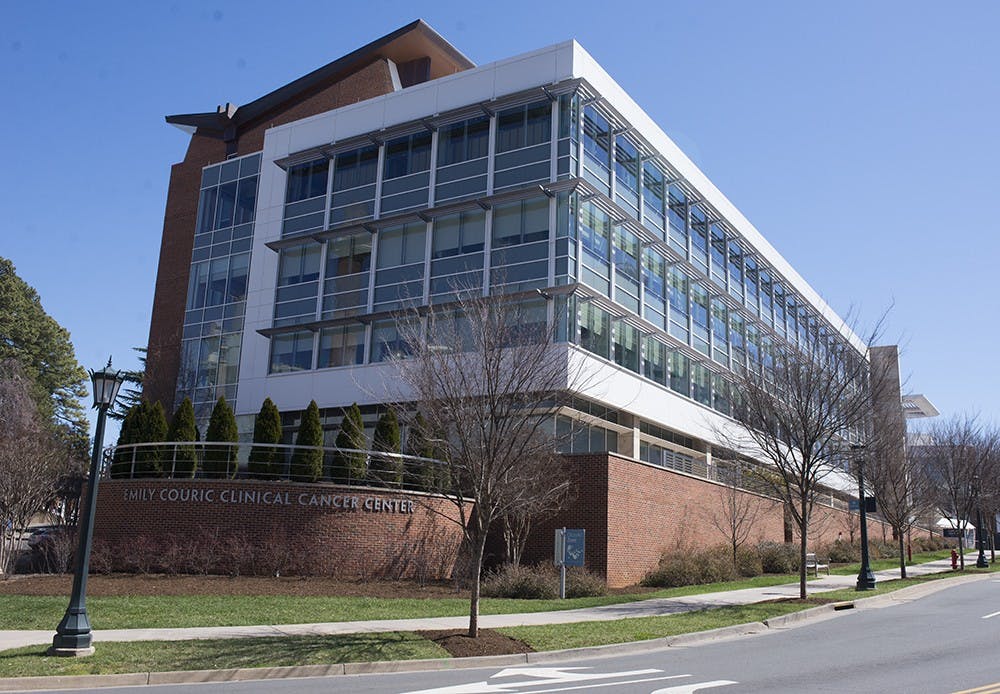中文版请点击此处
The University’s Comprehensive Cancer Center is working to establish the Center for Systems Analysis of Stress-Adapted Cancer Organelles, which seeks to find the cause of cancer in individual organelles, in the wake of a $12 million grant awarded for their efforts to disrupt tumor growth. Biomedical Engineering Prof. Kevin Janes and Matthew Lazzara, professor of chemical engineering and biomedical engineering, will direct the new center.
The Cancer Center is also harnessing the award to bolster its mission of supporting undergraduate research opportunities both within this new working group and beyond.
Janes feels that what distinguishes research at the University is the incorporation of strong engineering themes to the cancer research mission at the Cancer Center. He said that there are three pillars to the center — basic science, clinical research and population health research.
“Though engineering doesn’t fit into any of the pillars cleanly, faculty have always been very welcome into the cancer research mission,” Janes said.
The $12 million award is the reflection of integration and communication over many years, Janes said, adding that cross-departmental collaboration and involving new perspectives have enabled the team to come up with compelling, competitive and innovative ideas.
The grant is funding the training of the center, technology, outreach and improvement of the salaries of professors and researchers. Currently the center consists of 14 labs, each with eight to 12 full-time members. The co-directors of the Cancer Center plan to invest a significant amount of time and money into expanding the center.
Lazzara will be involved with the core of outreach efforts. He plans to organize a residence program where students can learn research techniques and hopes to have an increase in the number of undergraduate students involved in the new center.
The center’s new email address is a place where students can send general inquiries and will be checked daily to match students up with professors who are in need of helpers.
Lazzara also wants to add in formalized programs for the students to participate in a more broad manner. The specifics are still to be determined, as Lazzara works with Jennifer West, dean of the School of Engineering, to build this program up.
Its new website details their specific projects, team members, previous publications and resources.
The grant has opened up many opportunities for new members to get involved in the cancer center, and the directors are very excited to see what the future holds.
The grant is also helping the Cancer Center to continue its ongoing projects.
For example, Janes has been working closely with clinicians, such as practicing oncologists, oncological surgeons and pathologists to study proteins and genes that have to do with the triple negative subtype for breast cancer. This is a type of breast cancer that does not have any receptors that can be turned off, making the survival rate lower.
Janes explains that the suppression of a gene will sometimes turn off “good” or “bad” genes. Therefore, cancer occurs when “bad” genes are no longer suppressed.
“[Loss of suppression] occurs through an interesting route that doesn’t involve genetics — it really involves cell biology,” Janes said. “We hope to discover … tumor progression and suppression with that focus on cancer cell biology.”
Janes is also researching the ways in which subcompartmental components, or organelles, adapt in different progressions of cancer. Specifically, he hopes to look at the reconfiguration of organelles with the Cancer Systems Biology Consortium, an association that works to address and understand issues in cancer by looking at how biology systems intersect with systems analysis.
“Engineers will have track records and modeling approaches to look at models holistically and what organelles will do under different contexts,” Janes said.
Lazzara is interested in using computers and algorithms to model classic drugs in the clinical setting in order to determine which drugs work and which don’t work with specific chemotherapeutics. He is also interested in working with subculture models.
Another professor whose research will be largely benefitted by the grant is Richard Price, professor of biomedical engineering and radiology and medical imaging, who uses focused ultrasound technology in his work.
“One idea we pursue is to use the focused ultrasound energy to heat, disrupt or destroy some of the tumor tissue,” Price said.
Lazzara is most excited about the opportunity to bring aboard new dedicated and experienced individuals who will create and solve advanced projects and work to find cures relevant to human health.
“We want to encourage undergraduate students to work with us,” Lazzara said. “There are many opportunities opening up and we want the most motivated ones to apply to come work with us.”







